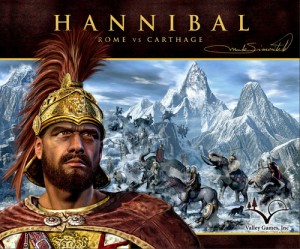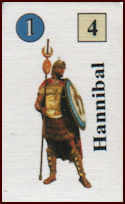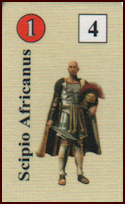By Fred W. Manzo and Gary Andrews
Playtesters: Harvey Mossman, Barry Friedman, Gary Andrews, Ron Herel, Roger Cooper, Stewart Schoenberger and Fred W. Manzo
 Hannibal: Rome vs Carthage is an elegant board game which we have played since it was released in 1996. It is a great game, exciting, tense in its play balance, a game of nuanced decisions that allow you wide latitude in your actions. It is a “can do” game, one that allows you a range of possible choices rather than denying you possibilities. For all this it is relatively simple. One of the few shortcomings to it is that it is made for two players. We have always thought it would be even more fun as a multiplayer game (in fact we would frequently play the original game with two players on a side). So we devised this 4-player variant.
Hannibal: Rome vs Carthage is an elegant board game which we have played since it was released in 1996. It is a great game, exciting, tense in its play balance, a game of nuanced decisions that allow you wide latitude in your actions. It is a “can do” game, one that allows you a range of possible choices rather than denying you possibilities. For all this it is relatively simple. One of the few shortcomings to it is that it is made for two players. We have always thought it would be even more fun as a multiplayer game (in fact we would frequently play the original game with two players on a side). So we devised this 4-player variant.
This article presents the setup, card, rules and victory condition modifications necessary to allow for a competitive four-player variant of Valley Games board game Hannibal: Rome vs Carthage. Note that this variant defaults to the standard Hannibal: Rome vs. Carthage rules whenever possible.
No HRC rules have been harmed in the making of this variant.
Honos (Latin) 1. honor, position, office, post, respect, regard, mark of esteem, reward, dignity, grace or public office.
I. Constituo
1. This variant begins with two allied players per side. The two Roman allied players lead either their Copper or Silver Faction, while the two allied Carthaginian players lead either their Copper or Silver Factions. Whichever Faction currently has the most Honor Points (HP) will be the Dominant Faction for that side. The Dominant Faction may change from turn to turn, depending on the current HP totals.
2A. It also opens with Hannibal a full member of Carthage’s Silver Faction and Hanno a full member of Carthage’s Copper Faction. In addition, P. Scipio, a Roman consul, is initially a full member of Rome’s Silver Faction and T. Longus, the other Roman consul, is initially a full member of Rome’s Copper Faction. Each Faction is controlled by only one player.
2B. Factions already control the following provinces, and associated Honor Points (HP), when play begins.
Rome’s Silver Faction starts as its Dominant Faction and controls the following northern Italian provinces:
Etruria (1 HP)
Samnium (1 HP)
Latium/Rome (5 HP)
Campania (1 HP)
Rome’s Copper Faction initially controls the following southern provinces:
Sardinia/Corsica (1 HP)
Sicilia (1 HP)
Syracuse (2 HP)
Lucania (1 HP)
Apulia (1 HP)
Carthage’s Silver Faction initially controls the following Spanish provinces:
Baetica (1 HP)
Orospeda (1 HP)
Celtiberia (1 HP)
Carthage’s Copper Faction starts as its Dominant Faction and controls the following provinces in north Africa:
Western Numidia (1 HP)
Eastern Numidia (1 HP)
Carthaginia (2 HP)
Carthage (5 HP)
2C. After players decide which side they will play, if necessary a bidding system based on command of provinces may be used to settle which friendly Faction a player controls (e.g., “I’m willing to transfer control of Celtiberia to the Carthaginian Copper Faction in order to run Hannibal and his Silver Faction”).
3. Immediately following every reinforcement phase sides ascertain which of their Factions is Dominant. The Faction with the most Honor Points from all sources then becomes its side’s Dominant Faction for the rest of the turn. If both partners have an equal number of Honor Points dominance does not change.
4. The Dominant Roman Faction determines who will be their Proconsul for the turn.
Note: There are two types of generals in this variant, those that are full, core members of their Faction (also known as Full Generals) and less trusted generals on a Faction’s fringe (also known as Lesser Generals). Full Generals always remain trustworthy members of their original Faction (although they may temporarily follow the suggestions of an allied leader when it is deemed a wise thing to do), while Lesser Generals simply follow the orders of whichever friendly Faction leader activated them.
5.  Both Roman Consuls and the Carthaginian generals Hannibal and Hanno are the only Full Generals in a game. Each Faction has only one Full General. Full Generals sometimes reluctantly follow the orders of their allied Faction leader (see rule 14).
Both Roman Consuls and the Carthaginian generals Hannibal and Hanno are the only Full Generals in a game. Each Faction has only one Full General. Full Generals sometimes reluctantly follow the orders of their allied Faction leader (see rule 14).
6A. Roman Proconsuls and the Carthaginian generals Hasdrubal, Gisgo and Mago (I.E., all the generals on the map not Full Generals) are treated differently than Full Generals. These Lesser Generals (or virtual Proconsuls) are considered temporary members of the friendly Faction that activated them last. They must remain members of that Faction until their allied friendly Faction leader activates them or they are removed from the board. Either Faction leader may activate and so completely control any friendly Lesser General whenever it is his turn to play a card.
6B. When in the same space as any full general or any friendly general of the same Faction, lesser generals will always acquiesce to demands for troop transfers. If, however, they find themselves in a space with their partner’s lesser generals or proconsuls, such transfers must have the approval of both friendly leaders.
 7. While in play a general must be a member of a friendly Faction. The player controlling the Dominant Faction assigns initial control of all friendly Lesser Generals when they become Proconsuls or enter play. This includes Scipio Africanus and his 5 CU escort. Once displaced a general’s faction allegiance is cancelled.
7. While in play a general must be a member of a friendly Faction. The player controlling the Dominant Faction assigns initial control of all friendly Lesser Generals when they become Proconsuls or enter play. This includes Scipio Africanus and his 5 CU escort. Once displaced a general’s faction allegiance is cancelled.
8. Players may place a penny next to generals in order to signify they are a member of the Copper Faction or a dime to signify they are a member of the Silver Faction.
9. Roman consuls are elected as normal each turn. However, the Dominant Roman Faction first chooses which general will be a member of his Faction, after which his partner chooses his consul. Roman consuls remain a member of the same Faction through the end of a turn. However, due to new elections they might then continue as before, switch Factions, become fringe members of either Faction or temporarily retire. Next, the Dominant Roman Faction leader assigns his consul to an army and then his partner assigns his consul. If Roman generals from two different Factions find themselves in the same space at the start of a turn they initially divide any CUs there equally with any odd CU going to the Dominant Faction general, unless a consul’s minimum army size must be taken into account (but see rule 6B).
10. Players may never attack their partners, change Factions or sides, receive strategy cards from others (except during the Messenger Intercept event), or inform their partner which unplayed cards they possess. Once play begins players may not trade among themselves (besides such normal game functions as re-assigning combat units to one of two or more general in the same space. Of course, any actions involving a full general and his army must have the approval of his Faction leader). All the forces, generals, cards, Political Control markers and Combat Units under one side’s control are considered friendly to both of its allied partners.
II. Honos
Only honorable people win this variant. That is, a player is victorious if his side wins and he ends the game with more Honor than his partner.
 11. Most provinces are identified by cards or chits showing their worth in Honor Points (HP). Faction leaders begin with Honor Points (HP) for the provinces their Faction initially command. Whenever a player gains control of a province its HPs are awarded to his Faction. And conversely, when a player loses control of a province its card/chit is returned to the board or given to the player who now controls it. The Honor generated by these political changes may take place even after a battle is fought (see rule 13B).
11. Most provinces are identified by cards or chits showing their worth in Honor Points (HP). Faction leaders begin with Honor Points (HP) for the provinces their Faction initially command. Whenever a player gains control of a province its HPs are awarded to his Faction. And conversely, when a player loses control of a province its card/chit is returned to the board or given to the player who now controls it. The Honor generated by these political changes may take place even after a battle is fought (see rule 13B).
12. A player also collects Honor Points when one of his generals wins a battle. The number of HPs his victory generates is equal to the total number of Political Control markers the defeated side must initially remove due to combat through retreat, attrition and the elimination of Hannibal (but see rule 14). Which PC markers to remove usually are determined by the losing player’s partner. He may remove any friendly PC marker he wishes. When, however, neither partner was directly involved, such as when the defeated forces were leaderless, each partner on the losing side removes an equal number of friendly PC markers. If an odd number of PC markers must be removed the losing Dominant Faction leader removes the larger amount. (Also see rule 13B).
13A. In addition to all normal effects the player who took control of his partner’s Full General and went on to see him defeated also loses a number of Honor Points equal to the number of PC markers lost.
13B. Plus, when the player who won a battle employed his own Full General, he may decide which enemy PC markers to remove. In these cases, only enemy PC markers within 2 spaces of the battle space may be removed and even replaced by friendly PCs. (Each friendly PC placed is worth two enemy PCs removed). Such spaces may not be separated from the battle site by mountain passes, straits, or be occupied by enemy CUs.
14. Either allied player may activate any friendly general. So at times a Faction leader may be forced by circumstances to activate his partner’s Full General, although it is certainly not honorable to activate a core member of an allied Faction and then lead him onto defeat. (Remember, this concerns players activating a Full General, not a Lesser General). In these cases any gain in honor is divided equally between the allies (rounded downward). After all, it’s the only honorable thing to do. But, the temporary ability to convince your partner’s Full General to follow your orders ends either immediately after a battle or, if no battle took place, immediately after the Full General stops movement. He then reverts to the control of his original Faction leader.
15. A player, however, must first receive permission to activate his partner’s Full General. If the player originally controlling the Full General vetoes the proposed move the card played in the effort is discarded unused and the turn ends. For example, say the Carthaginian’s Copper Faction leader wants to activate Hannibal, who is a core member of their Silver Faction. The Copper leader must first play a card and then ask permission of his partner, the Silver Faction leader, to activate Hannibal. If the Silver leader then agrees to the Copper leader’s proposal to temporarily control Hannibal any honors due to a subsequent victory in combat will be divided evenly (rounded downward), but any lose will result in the Copper leader losing Honor Points equal to the number of PC that the Carthaginians must remove, in addition to the winning Roman Faction leader gaining the same number of Honor Points. If, the Silver Faction leader vetoes the proposed move as reckless, the card played in this effort is discarded unused and the Carthaginian’s turn ends.
16. Honor Points generated by combat are recorded on a piece of paper or with Honor Point chits. Note only the enemy PC markers initially required to be removed by combat losses, including losses from attrition, retreat and the elimination of Hannibal, are counted towards HPs. Any other enemy PCs that are removed are done so solely for the good of the Republic.
17. Summary of Honor Lost and Won:
- A. Battle: A player wins honor when a general he controls, at least partially, wins a battle.
- B. Politics: Honor is also won politically when a player places the last PC marker needed to control a province. Plus players obtained Honor if they began in control of a province. (see rule 11).
- C. Events: A player gains honor when he activates a general who then captures an enemy province through siege (E.G. Syracuse, Rome and Carthage). However, if the activating player used his partner’s full general, any honors gained must be shared equally (see rule 14), with fractions rounded downward. A Carthaginian player gains honor by capturing Syracuse through the use of the Syracuse Revolts card.
- D. Fortuna: Honor is lost when a player loses control of a province or loses a battle when employing his partner’s Full General.
III. Actio
18. Which side activates first in a turn is determined in the normal manner, with Dominant Faction leaders making these decisions. They also decide which partner will play a card (but not which card their ally will play). Sides alternate card play as normal.
19. Alliance-wide actions not specifically mentioned as under one player’s control are made by mutual agreement. For example, which partner controls the battle cards of a friendly but leaderless force or which PC markers to remove due to year end Political Repercussions are all decisions made jointly by friendly players. A die may be used to break deadlocks.
20. In addition to all normal game restrictions regarding the placement of regular reinforcements players must follow these limitations:
- A. The Dominant Roman Faction decides where 3 of their 5 CUs regular reinforcements appear and then his partner determines where the other 2 CUs appear.
- B. The Carthaginian Copper Faction leader determines where to place the 1 CU reinforcement in Africa and the Silver Faction leader places the 1 CU free placement reinforcement. Whichever Carthaginian Faction controls the most provinces in Hispania may place the remaining CUs there as he wishes. (If both players control an equal number of provinces in Hispania then their Dominant leader decides how these CUs are used.)
IV. Charta
21. Each player activates and controls the effects of his own cards as he alone sees fit. The enemy side is considered as a whole for card purposes. That is, an event that mentions the enemy may be used against either enemy player. For example, the Messenger Intercepted card and the Phillip V card will cost the enemy one card in total. (Of course, the Faction that played the M.I. card receives the return card.) Who the card affects is solely up to the player controlling the strategy card and the wording on the card itself.
22. Players receive 4 cards each for turns 1 through 6. They receive 5 cards each for turns 7 through 9.
23. Interrupt cards may be used against either enemy player by either allied player at any time as per the wording on the card. (Note: card # 59, “Ally Deserts,” results in a battle card being given to the general actually fighting the battle, not necessarily the Faction leader who played the card.)
24. Once players have examined their strategy cards each turn discussions must be held to a minimum and take place in PUBLIC, although strategy may be discussed in private both before the game begins and between turns.
25. A game turn ends when all of the players have used all of their cards.
V. Victoria
The usual victory conditions remain in place. However, it will also be necessary to decide who finished first, second, third and fourth. The winning side’s player with the most Honor when the game ends is proclaimed “First Among Equals” and “Worthy of Commanding Romans (or Carthaginians, as the case may be) in Battle.” In second place is the Faction of the winning side that had the least HPs. The third place finisher is the losing side’s best Faction in terms of Honor and the player in fourth place is the losing side’s Faction with the least Honor.
VI. Conclusio
In conclusion, we particularly like the fact that this variant does not suffer from that bane of multi-player games: the “let’s gang up on the leader” syndrome. Players in third and four place are already doing all they can to defeat the leader and so have no reason to change their tactics, while the player in second place is given only the choice of being in second place or fourth. Of course, he can attempt to replace his ally in first place, but in order to do so he must generate additional Honor, which is exactly what he was supposed to be doing anyway.
Needed Cards/Chits/Markers
Italia:
- 1. G. Cisalpinia – 1 HP
- 2. Etruria – 1 HP
- 3. Samnium – 1 HP
- 4. Latium – 5 HP
- 5. Apulia – 1 HP
- 6. Lucania – 1 HP
- 7. Campagnia – 1 HP
Islands in the Med:
- 8. Sicilia – 1 HP
- 9. Syracuse – Two 1 HP chits, for use if the Honor in taking Syracuse by siege must be shared.
- 10. Sardinia – 1 HP
Hispania:
- 11. Idubeda – 1 HP
- 12. Orospeda – 1 HP
- 13. Celtiberia – 1 HP
- 14. Baetica – 1 HP
Africa:
- 15. W. Numidia – 1 HP
- 16. E. Numidia – 1 HP
- 17. Carthaginia – 2 HP
- 18. Carthage – 5 HP
Gaul:
- 19. Gallia Transalpina – 1 HP
- 20. Massilia – 1 HP
(Liguria and the Balearic Islands remain politically unimportant.)
Informational:
- Dominant Roman Faction (a temporary position)
- Dominant Carthaginian Faction (a temporary position)
- Roman Silver Faction Leader (permanent)
- Roman Copper Faction Leader (permanent)
- Carthaginian Copper Faction Leader (permanent)
- Carthaginian Silver Faction Leader (permanent)









